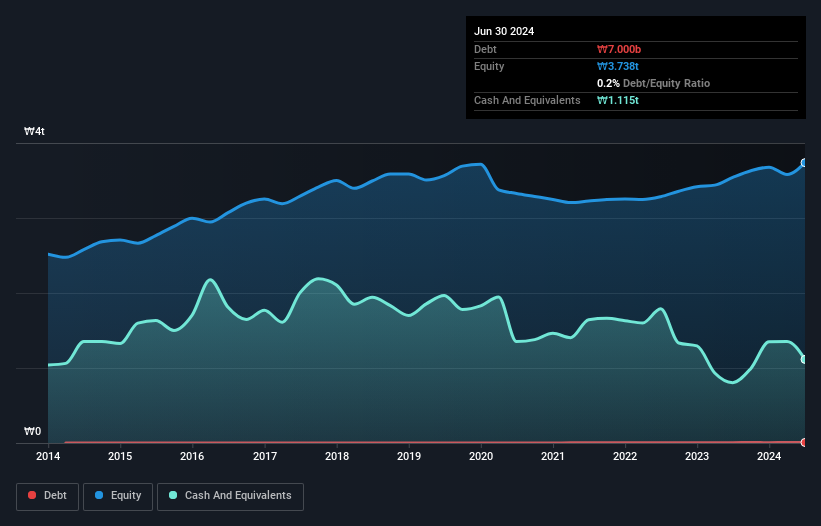Some say volatility, rather than debt, is the best way to think about risk as an investor, but Warren Buffett famously said that 'Volatility is far from synonymous with risk.' So it seems the smart money knows that debt - which is usually involved in bankruptcies - is a very important factor, when you assess how risky a company is. We can see that Kangwon Land, Inc. (KRX:035250) does use debt in its business. But the more important question is: how much risk is that debt creating?
When Is Debt A Problem?
Debt is a tool to help businesses grow, but if a business is incapable of paying off its lenders, then it exists at their mercy. Ultimately, if the company can't fulfill its legal obligations to repay debt, shareholders could walk away with nothing. However, a more usual (but still expensive) situation is where a company must dilute shareholders at a cheap share price simply to get debt under control. Having said that, the most common situation is where a company manages its debt reasonably well - and to its own advantage. The first thing to do when considering how much debt a business uses is to look at its cash and debt together.
Check out our latest analysis for Kangwon Land
What Is Kangwon Land's Net Debt?
The image below, which you can click on for greater detail, shows that at June 2024 Kangwon Land had debt of ₩7.00b, up from ₩4.55b in one year. But it also has ₩1.11t in cash to offset that, meaning it has ₩1.11t net cash.

A Look At Kangwon Land's Liabilities
The latest balance sheet data shows that Kangwon Land had liabilities of ₩566.4b due within a year, and liabilities of ₩67.0b falling due after that. Offsetting these obligations, it had cash of ₩1.11t as well as receivables valued at ₩20.8b due within 12 months. So it can boast ₩502.0b more liquid assets than total liabilities.
This surplus suggests that Kangwon Land has a conservative balance sheet, and could probably eliminate its debt without much difficulty. Simply put, the fact that Kangwon Land has more cash than debt is arguably a good indication that it can manage its debt safely.
But the other side of the story is that Kangwon Land saw its EBIT decline by 3.0% over the last year. That sort of decline, if sustained, will obviously make debt harder to handle. There's no doubt that we learn most about debt from the balance sheet. But it is future earnings, more than anything, that will determine Kangwon Land's ability to maintain a healthy balance sheet going forward. So if you want to see what the professionals think, you might find this free report on analyst profit forecasts to be interesting.
But our final consideration is also important, because a company cannot pay debt with paper profits; it needs cold hard cash. While Kangwon Land has net cash on its balance sheet, it's still worth taking a look at its ability to convert earnings before interest and tax (EBIT) to free cash flow, to help us understand how quickly it is building (or eroding) that cash balance. Happily for any shareholders, Kangwon Land actually produced more free cash flow than EBIT over the last three years. There's nothing better than incoming cash when it comes to staying in your lenders' good graces.
Summing Up
While it is always sensible to investigate a company's debt, in this case Kangwon Land has ₩1.11t in net cash and a decent-looking balance sheet. The cherry on top was that in converted 126% of that EBIT to free cash flow, bringing in ₩243b. So we don't think Kangwon Land's use of debt is risky. When analysing debt levels, the balance sheet is the obvious place to start. But ultimately, every company can contain risks that exist outside of the balance sheet. To that end, you should learn about the 3 warning signs we've spotted with Kangwon Land (including 1 which is potentially serious) .
If you're interested in investing in businesses that can grow profits without the burden of debt, then check out this free list of growing businesses that have net cash on the balance sheet.
Valuation is complex, but we're here to simplify it.
Discover if Kangwon Land might be undervalued or overvalued with our detailed analysis, featuring fair value estimates, potential risks, dividends, insider trades, and its financial condition.
Access Free AnalysisHave feedback on this article? Concerned about the content? Get in touch with us directly. Alternatively, email editorial-team (at) simplywallst.com.
This article by Simply Wall St is general in nature. We provide commentary based on historical data and analyst forecasts only using an unbiased methodology and our articles are not intended to be financial advice. It does not constitute a recommendation to buy or sell any stock, and does not take account of your objectives, or your financial situation. We aim to bring you long-term focused analysis driven by fundamental data. Note that our analysis may not factor in the latest price-sensitive company announcements or qualitative material. Simply Wall St has no position in any stocks mentioned.
About KOSE:A035250
Kangwon Land
Engages in the casino, tourist hotel, and ski resorts businesses in South Korea.
Excellent balance sheet established dividend payer.
Similar Companies
Market Insights
Community Narratives



